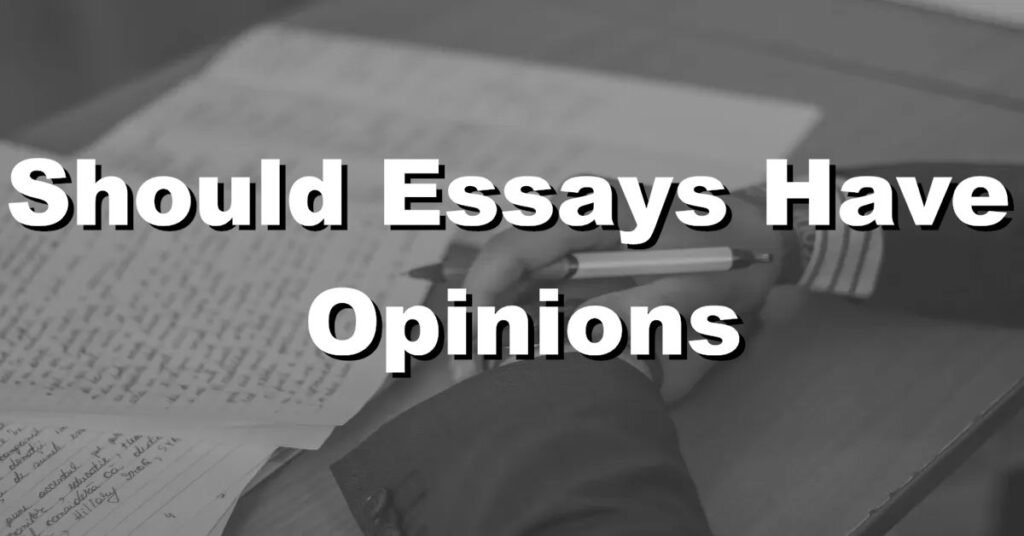Essays are a common form of academic writing that aims to inform or persuade the reader about a particular topic. One question that often arises when writing essays is whether or not to include personal opinions.
While some may argue that essays should be objective and free of personal bias, others believe that including opinions can strengthen the writer’s argument and make the essay more engaging for the reader. In this blog post, we will explore both sides of the argument and determine whether or not essays should have opinions.
The Importance of Objectivity in Academic Writing
In academic writing, objectivity plays a vital role in maintaining the integrity and credibility of scholarly work. Objectivity refers to presenting information, arguments, and analysis in a neutral and unbiased manner, without personal biases or emotions. It requires writers to base their claims on verifiable evidence, logical reasoning, and reliable sources.
The importance of objectivity lies in its ability to ensure fairness, accuracy, and soundness in academic discourse. By adopting an objective approach, writers demonstrate their commitment to rigorous research, critical thinking, and the pursuit of truth. Objectivity also helps to build trust with readers, as it provides a solid foundation for evaluating and validating the arguments presented.
In academic writing, objectivity is especially crucial as it upholds the values of intellectual honesty, transparency, and scholarly rigor, contributing to the advancement of knowledge and understanding.
Balancing Objectivity and Subjectivity: The Role of Personal Opinions in Essays
While objectivity is highly valued in academic writing, there are instances where including personal opinions in essays can offer unique benefits. Personal opinions provide a window into the writer’s perspective, allowing for a deeper engagement with the topic and fostering a connection with the reader.
Including personal opinions can make an essay more relatable and captivating, adding a human element to the analysis. However, it is crucial to strike a balance between objectivity and subjectivity. Writers should clearly distinguish between factual information and personal opinions, supporting the latter with reasoned arguments and evidence.
By acknowledging their biases and being transparent about their standpoint, writers can present their opinions in a responsible and thoughtful manner. It is important to note that the appropriateness of including personal opinions varies across different types of essays. In argumentative or persuasive essays, personal opinions play a significant role as they aim to persuade the reader.
On the other hand, in research-based or analytical essays, personal opinions should be minimized to prioritize objectivity and focus on evidence-based analysis. Finding the right balance between objectivity and subjectivity is essential for creating well-rounded and impactful essays.
Finding Balance Between Objectivity and Subjectivity in Essays
Finding a balance between objectivity and subjectivity is a delicate task in essay writing. While objectivity strives for impartiality and factual accuracy, subjectivity acknowledges the influence of personal experiences and perspectives. It is crucial to recognize that complete objectivity may be unattainable, as every writer brings their own biases and background to the table.
Striking a balance involves critically analyzing the topic, presenting well-supported arguments, and acknowledging alternative viewpoints. This allows the writer to maintain a sense of objectivity while still expressing their subjective interpretations. Moreover, the role of opinions varies across different types of essays.
In research-based essays, opinions should be rooted in evidence and presented with caution to maintain objectivity. Conversely, in personal reflection or narrative essays, opinions take center stage, as the writer’s subjective experiences and insights drive the narrative.
Adapting the level of subjectivity and objectivity to suit the purpose and requirements of each essay type is essential for achieving a well-rounded and persuasive piece of writing.
Role of Opinions in Different Types of Essays
Opinions play a significant role in shaping the content and purpose of essays across various genres. In persuasive essays, opinions take center stage as the writer aims to convince the reader of a particular viewpoint. These opinions are supported by evidence, logical reasoning, and persuasive language.
In contrast, argumentative essays rely on opinions to present multiple perspectives on a topic, exploring the strengths and weaknesses of each viewpoint. In personal reflection or narrative essays, opinions are essential in conveying the writer’s subjective experiences, emotions, and reflections.
These essays allow for self-expression and encourage the writer to share their thoughts and insights. However, in research-based essays, opinions are tempered by the need for objectivity. While opinions may be present, they must be supported by credible sources and logical reasoning to maintain the essay’s credibility and scholarly rigor.
Understanding the appropriate role of opinions in different essay types allows writers to effectively engage readers, present arguments persuasively, and convey personal experiences authentically.
Conclusion
As we explore the pros and cons of including opinions in essays, it’s important to keep in mind the purpose of the essay and the expectations of the reader.
Ultimately, the decision to include opinions will depend on the specific requirements of the assignment and the writer’s personal style and preference.

